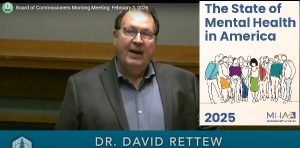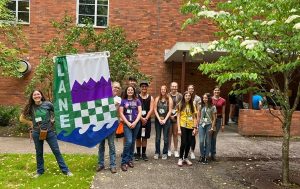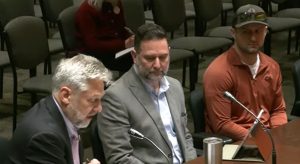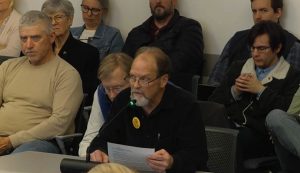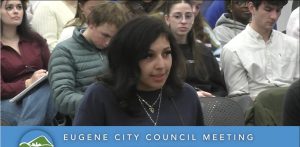Home Share Oregon tackles the housing crisis
7 min read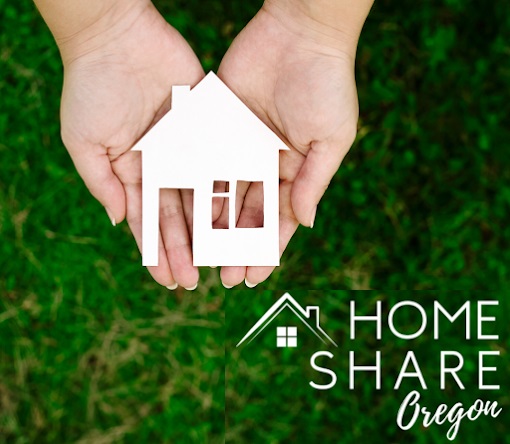
Southeast Neighbors learned about a new nonprofit that was formed in response to the housing crisis. At the November neighborhood meeting from Home Share Oregon, Judy Smith.
[00:00:09] Judy Smith (Home Share Oregon): I am here to talk to you about Home Share Oregon. We are a new nonprofit. We’ve been around for about a year and a half.
[00:00:16] I like to think that Home Share Oregon started with a question: What else can we do to get affordable housing for Oregonians? Some people up in Portland asked some good questions, did some research, and came up with the idea to expand access to affordable housing through home sharing.
[00:00:35] We believe that this is a direct way to prevent housing instability, foreclosure, and homelessness. We envision a world in which every person has a clean, safe home—a world where home sharing is normalized as a lifestyle preference and homelessness is uprooted.
[00:00:53] Our number one goal is to shift the cultural perspective of home sharing. We want it to become normal. It’s not a new idea. Stockholm, Sweden, when they send their students off to college, they don’t have dorms. They place them in the homes of seniors, and there’s this collaborative arrangement that happens there.
[00:01:11] It’s not a new idea, but it’s new to this culture, and we need to take people from the part where they’re like, ‘Oh my gosh, that sounds dangerous. I would never do that.’ And our hope is eventually through conversations like this, we can take people to the idea of, ‘You know, that’s such a good idea and why am I not doing it?’
[00:01:29] Let’s talk about the housing crisis. Do you know we had a housing crisis? You know, we do. The national average for rental availability is a 95% occupancy rate. That means of all the rentals in our country, only 5% of them are available to rent ‘cause they’re already full. That’s a pretty, pretty high number and here in Oregon, we’ve got a slightly higher occupancy rate. Our state is at 96.7% capacity.
[00:01:58] 36.8% of our population right here in Oregon say they were behind on their rent or their mortgage and were likely to face losing their home due to eviction or foreclosure. And there was a report that also came out of Portland Street Roots, they are fearing something they’re calling ‘aged homelessness.’ Nearly 40% of all Oregonians over the age of 65 say that they’re at risk of losing their homes.
[00:02:25] What’s the solution? Well, we got an idea. Do you know there are 1.5 million spare rooms in Oregon? We got that out of the Census. The Census is full of good information.
[00:02:36] One of our board members did a little math and decided if we could just fill 2% of those rooms that are already built, you don’t have to change your urban growth boundaries. You don’t have to wait two years for an apartment to get built. They’re already sitting there.
[00:02:50] If we could sell 2%, that would give us housing for 30,000 people and it could give a homeowner some extra income, 30,000 people with a little more financial resiliency. For people that aren’t making their monthly expenses, this can be a win-win for them, mutually beneficial for both parties. It’s flexible, it’s affordable.
[00:03:10] You know, the average price of a home share in Oregon is between $650 and $850 a month. That’s affordable. If you put somebody in affordable housing, they’re not going to end up living in their car. And it’s efficient and independent the way that we do it. We think it’s a really good idea and that’s why I’m talking to you tonight.
[00:03:30] John Q: So how does it work?
[00:03:32] Judy Smith: Oh my gosh. This is the question. Well, it’s a little bit like a dating service, a little bit like Airbnb, kind of a cross between the two. But you build a profile, you monitor your account, you review your matches, you decide to message one, and you reach out and you communicate via this app.
[00:03:50] Both the home provider and the home seeker answer the same questions. So you’re matched based on location and compatibility. It kind of clears the field a little bit. You communicate more with them.
[00:04:02] When you finally find someone you think is a good fit, go meet them, maybe for coffee, maybe at the library, at a dog park. And you have an extended conversation, to see if this is a good fit and idea. And most important, my most important advice if you’re thinking about doing this, is to take the time, takes time to find a good fit.
[00:04:22] And you make a plan and you do it in writing. In terms of security, we think that’s really important.
[00:04:29] And we pay for criminal background checks for both parties. We want the renter, the home seeker to feel secure, as does the homeowner. We think we should check for references. We think you should have that written signed home share agreement that has more than just when the renters do it, it has expectations and house rules and things like that.
[00:04:49] A home share agreement should have something in there about what are we going to do if we disagree, right? And how, what is the process we’re going to use? So it’s very customized.
[00:04:58] And again, though, we don’t do that for people. We guide them along the way. And we have home share agreements that we can make available to you, so you can customize it for yourself. The one online is signed on DocuSign, so then it becomes a legal agreement. If you do a paper one or a virtual one on your own, it’s a good idea to have it notarized.
[00:05:17] And we should have an escape clause in case it’s not working out. We recommend here in Oregon that homeowners consider keeping it on a month-to-month basis until you’re sure that you want it to be longer. We encourage people to have a clause in their home share agreement that says, if for any reason this isn’t working for either party, that we agree to dissolve it with 30 days notice.
[00:05:44] We think anyone with a spare room should consider doing this. It’s really great for empty nesters. It’s really, really attractive to seniors, both for the home providers because we have some seniors, especially if a spouse has passed away and their income has cut in half from Social Security, they want to stay in their homes. A great way to do it ’cause you can get some rent for that room.
[00:06:05] If you’ve experienced a major life transition, people struggling with isolation—I talk to a lot of folks that are lonely and they have a big house and they live in it by themselves and sometimes it seems like a really good idea. Some of our older folks like to match with a younger, more able-bodied person because then they can help with chores and they can negotiate a lower rent for those chores. And anybody looking for community and change, again, it’s a new idea for this generation, but we think it’s a good one.
[00:06:35] John Q: Southeast Neighbors board member Emily Fox.
[00:06:38] Emily Fox: Do you ever match people, if somebody can only—can’t afford $500 and say they can only afford $200, do you ever help that match?
[00:06:46] Judy Smith: You know what, we don’t have the resources to help pay for somebody’s housing, but it can be negotiated. And honestly, if you are matching with someone and having them do chores around the house, I have learned that it’s really good to maybe put a financial value on that work. So all those things are negotiable. We’ve got lots of ideas, but if someone can only pay $200, and the homeowner is willing to take that, that is between them. We don’t put anybody in anyone’s home. We give you the tools. We empower people to do this for themselves. Does that answer your question?
[00:07:22] Emily Fox: Yes. Thank you.
[00:07:23] John Q: She was asked if the home share model can be used with tiny homes.
[00:07:29] Judy Smith: I’m so glad you asked that. I think this week alone, I’ve talked to three different women who would love to live in a tiny home. Right? They like the autonomy of it and the fact that the zoning has changed for single dwelling houses to have those. That is like the gold standard of what a lot of people would like to have.
[00:07:47] But other people really like the idea of living in community, ‘cause they’ve been isolated and it really is a personal thing. But yes, if people have tiny houses and they want to find someone who’s compatible, we would happily facilitate that for them.
[00:08:03] So I can’t do this alone. I am looking for a couple more volunteers for my sharing committee to move this forward here in our community. And I’m looking for more opportunities like this. So if you are a part of a safe community that cares about affordable housing, if you have a book club who might be—I will talk to anybody because I am passionate about what we’re trying to do.
[00:08:26] John Q: Judy Smith visits the Southeast Neighbors meeting in November. For more information see the website, HomeShareOregon.org.

